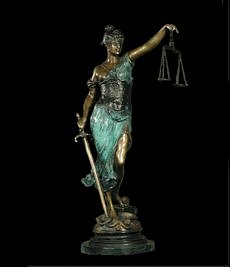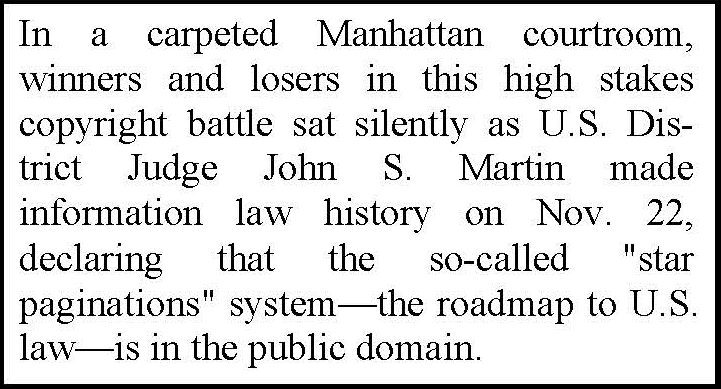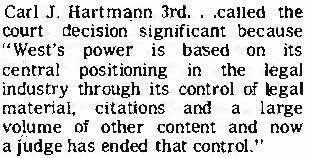|
|||||||||||

|
View the article in full page view by clicking HERE Lead trial and appellate counsel. A small electronic publisher fought a long and complex battle against the giant West Publishing -- in a landmark case which established the right of small publishers, lawyers, students and researchers to use the text of (and citations to) published judicial decisions without restrictions, and without paying fees to West. In two separate decisions, the Second Circuit affirmed federal district court decisions in favor of HyperLaw, holding that West did not have any copyright in either the judicial decisions or the citations in West’s Reporters. HyperLaw alone litigated the critical "text" issue -- and was the sole plaintiff in the Southern District of New York trial before Judge John Martin. The New York Times reported this as a case "experts [say] will drive down the price of legal research....[stripping] away much of the copyright protection claimed by West Publishing, the nation's dominant publisher of court cases, for its law books." In HyperLaw v. West Publishing VI (Appeal-Text), 158 F.3d 674, 48 U.S.P.Q. (BNA) 1560 (2d Cir. 1998) the Court of Appeals stated the following with regard to West's claims of copyright in the text of their reporters:
Co-plaintiff, Matthew Bender, did not participate in the portion of the case related to the text of judicial decisions. Thus, HyperLaw alone established that West and other legal publishers cannot stop (or charge for) the copying and use of the judges’ decisions, citations, names of counsel and other information in Reporters they did not specifically author. Nor can West and others stop the use of those decisions by lower cost and on-line publishers who provide access to the public for free or at greatly reduced cost. While West and Lexis produce excellent products with many additions which add extra value – such as headnotes and the ‘key number’ indexing system -- it is no longer mandatory that one must buy those additions simply to freely copy, use or make collections of judicial decisions. For an exhaustive description of what West claimed as its "authorship" and an analysis of the law related to those claims, it is useful to read both HyperLaw's Opposition Brief and West's Petition for Re-Hearing En Banc filed after its loss. In the companion decision, HyperLaw v. West Publishing V (Appeal-Citation), 158 F.3d 693; 1998 U.S. App. LEXIS 28024 (2d Cir. 1998) that same Court held that West's page numbering (star pagination) and first page citations (pinpoint cites) were equally deviod of any basis for copyright.
In expressly dismissing the 8th Circuit’s pre-Feist decisions in West Publishing Co. and Oasis as controlling, the Court stated
As the federal trial judge who heard both issues (Martin) commented,
HyperLaw persisted -- in what that same judge referred to as “litigation which threatened to leave whole forests bare because of the size and number of pleadings.” It is also instructive to read West's post-loss Petition for Hearing En Banc. a. The original district judge recused herself from hearing the case after HyperLaw’s arguments and a petition for mandamus to the Second Circuit. HyperLaw v. West Publishing I (Recusal of Judge Preska) 1995 U.S.Dist.Lexis 3820 (S.D.N.Y. 1995). b. West unsuccessfully challenged the right of HyperLaw and the other plaintiff Matthew Bender to bring the suit. HyperLaw v. West Publishing II (Justiciability), 1996 U.S. Dist. LEXIS 5871; 39 U.S.P.Q.2D (BNA) 1079; Copy. L. Rep. (CCH) P27,505; 24 Media L. Rep. 1972 (S.D.N.Y. 1996). c. HyperLaw pursued West through its antitrust efforts to purchase other publishers and ‘license’ judicial decisions to its competitor, Lexis. West Antitrust Decision III, 1998 U.S. App. LEXIS 12921 (D.D.C. May 29, 1998); West Publishing - Antitrust Decision I, 1997 U.S. Dist. LEXIS 1893; 42 U.S.P.Q.2D (BNA) 1867; 1997-1 Trade Cas. (CCH) P71,735 (D.D.C. February 27, 1997); and West Antitrust Decision II - The Subsequent Consent Judgment for Licensing Citations, 1997 U.S. Dist. LEXIS 2790; 1997-1 Trade Cas. (CCH) P71,754 (March 7, 1997). d. The trial court decided for HyperLaw on the text issues following a trial. HyperLaw v. West Publishing IV (Trial-Text of Opinions), 1997 U.S. Dist. LEXIS 6915; 42 U.S.P.Q.2D (BNA) 1930; Copy. L. Rep. (CCH) P27,638; 25 Media L. Rep. 1856 (S.D.N.Y. 1997). e. The trial court granted summary judgment to both plaintiffs on the citation issues. HyperLaw v. West Publishing III (Summary Judgment-Citation), 1997 U.S. Dist. LEXIS 2710 (S.D.N.Y. 1996). f. West appealed the $800,000+ fee award to HyperLaw’s counsel. HyperLaw Fee Decision II, 2001 U.S. App. LEXIS 896 (January 23, 2001); HyperLaw Fee Decision III (July 2, 2001); HyperLaw Fee Decision, 1999 U.S. Dist. LEXIS 19387 (January 16, 2000).
|
||||||||||



.jpg)
